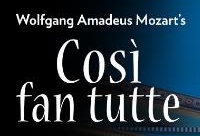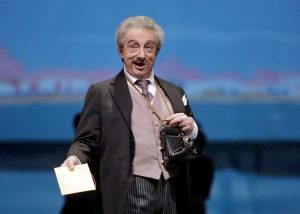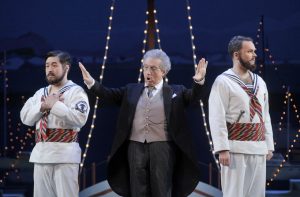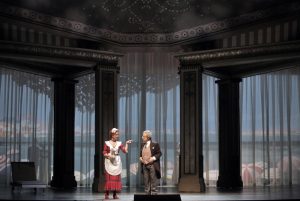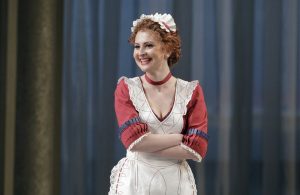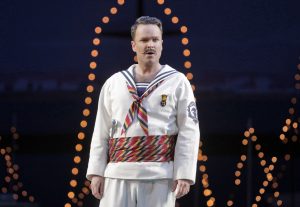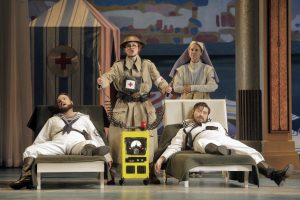A PRODUCTION TO COSÌ UP TO
A Lyric Opera season would not be complete without Mozart, so it was with great anticipation that I attended the opening night performance of Così Fan Tutte. Although this production is not new to Chicago, having been seen during the 2006-07 season, it remains fairly fresh due to its colorful seaside setting. Mozart’s magical music remains timeless, of course, especially when performed by a cast as multi-talented as this one. All of the faces will be familiar to Lyric subscribers — some more than others — except for that of Russian soprano Elena Tsallagova, making her U.S. debut. American conductor James Gaffigan also makes his Lyric debut.
Così Fan Tutte, ossia La Scuola degli amanti – to give the play it’s full title – roughly translates as “Thus Are All Women, or The School of Lovers.” Finished and first performed in 1790, it is one of Mozart’s best-loved comic operas. Utilizing a libretto by Lorenzo da Ponte, with whom Mozart also collaborated on Don Giovanni and The Marriage of Figaro, the opera pokes fun at the fickleness of women. The main protagonists are two soldiers, Ferrando and Guglielmo, and the sisters, Dorabella and Fiordiligi, to whom they are betrothed. Their friend Don Alfonso, who calls into question the fidelity of the soldiers’ fiancées, sets events in motion by making a bet. Ferrando and Guglielmo must pretend to go off to war, while disguising themselves as “Albanians” and seducing the sisters. Don Alfonso is aided in his scheme by the sisters’ maidservant Despina.
Will the sisters stay true to their lovers? Who will win the bet? The answers to these questions are not readily apparent, since the opera’s ending is ambiguous, allowing directors some creative license. Fortunately, much of the work’s misogyny is downplayed in this production, making Così Fan Tutte less a battle of the sexes than an engaging exploration of love and fidelity in uncertain and tumultuous times.
Set in 1914 at a seaside resort on the Mediterranean, the production easily resembles Monte Carlo, whose opera company was one of its original sponsors. The first scene begins in a casino, while the rest continues in the ladies’ rooms or on the expansive veranda overlooking the colorful marina. Robert Perdziola’s set designs are gorgeous and flexible, enabling quick changes of scenery. His costumes, however, are less impressive, as befits the times. Dorabella and Fiordiligi mostly wear simple cream-colored dresses or gray nursing uniforms, though there is one sexy scene when Dorabella strips down to her silky underwear.
Of the six principal roles, the most delightful to watch are Elena Tsallagova as Despina and Marianne Crebassa as Dorabella. (Crebassa’s only previous appearance at Lyric was two seasons ago as Stephano in Gounod’s Roméo et Juliette.) Both combined impeccably clear intonation and fluid phrasing with comic playfulness and exaggerated gestures.
Tenor Andrew Stenson as Ferrando might not have been as funny, but he more than made up for it with his sensitively rendered aria “Un aura amorosa.” He managed to imbue his voice with far more emotion and pathos than crowd favorite Ana MarÃa MartÃnez, whose performance was not one of her best. As Fiordiligi, her voice sounded thick and labored, while her acting seemed stiff and unnatural. One hopes (expects?) that her later performances will improve.
Though it does not promote modern notions of women’s equality, Così Fan Tutte does boast an equal number of male and female roles that are almost all as equally demanding. And even if it’s not one of Mozart’s best operas, it certainly showcases some of the composer’s best skills, especially for comedy and coloratura. Moreover, it is one of Lyric’s best productions so far this season, Gounod’s Faust being the only opera yet to come.
photos by Cory Weaver and Andrew Cioffi
Così fan tutte
Lyric Opera of Chicago
Civic Opera House, 20 N. Wacker Drive
ends on March 16, 2018
for tickets, call 312.827.5600 or visit Lyric Opera
for more shows, visit Theatre in Chicago
